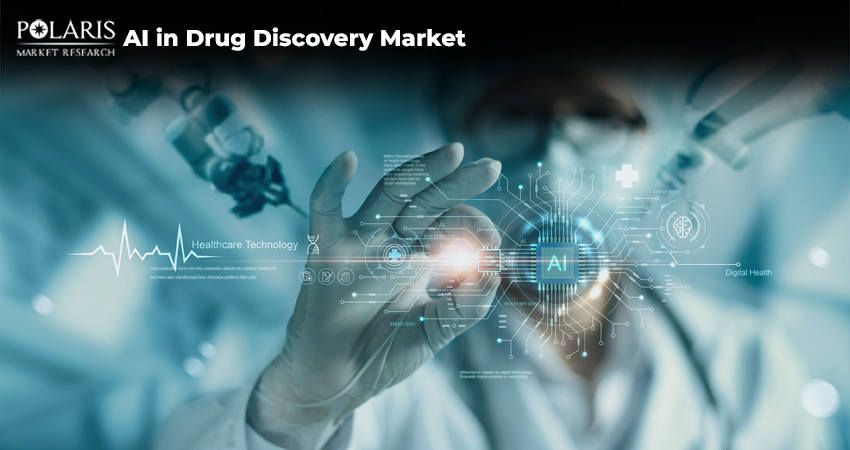Optimizing Clinical Trial Designs with AI in Drug Discovery Market

The quest to develop new medicines is a marathon, a complex and costly endeavor fraught with high failure rates and lengthy timelines. For decades, the pharmaceutical industry has relied on traditional methods of drug discovery, often involving laborious manual processes, high-throughput screening of vast chemical libraries, and extensive animal testing. However, the landscape is undergoing a tremendous shift, driven by the transformative power of artificial intelligence (AI).
AI holds immense promise for tackling some of the most challenging diseases and ushering in a new era of precision medicine. In this blog, we explore how AI is transforming the various phases of drug discovery. Also, it sheds light on the promising future the technology holds. Read on!
What is AI in Drug Discovery?
AI in drug discovery refers to the application of computational algorithms, predictive modeling, and data analytics to accelerate and optimize the process of finding new therapeutic candidates. Traditional drug development can take over a decade and billions of dollars; AI-powered solutions aim to shorten this timeline drastically while increasing the probability of success.
Key technologies involved include:
- Machine learning (ML) and deep learning
- Natural language processing (NLP)
- Predictive modeling
- Virtual screening and simulation
- Computational biology and bioinformatics
By analyzing vast amounts of biological data, AI can predict drug-target interactions, optimize molecular structures, and even design new compounds from scratch.
Market Metrics
The AI in drug discovery market size was assessed at USD 1.99 billion in 2024. The market is expected to expand from USD 2.65 billion in 2025 to USD 35.42 billion by 2034, demonstrating a CAGR of 29.6% between 2025–2034.
How AI is Transforming Each Stage of Drug Discovery?
Drug Target Identification
Finding the right biological target is critical. AI plays a crucial role in drug target identification by analyzing vast datasets and identifying potential biological targets, like proteins or pathways, that can be modulated by drugs to treat diseases. AI accelerates target discovery, providing insights into complex biological networks and identifying novel targets that might be overlooked by traditional methods. AI platforms in pharmaceuticals focus on finding novel targets with high precision.
Hit Identification and Virtual Screening
Once a target is found, the next step is to discover molecules that can interact with it. In AI-driven drug discovery, hit identification and virtual screening are crucial processes for finding promising candidates for drug delivery. Hit identification involves identifying compounds with desired activity against a biological target, often through computational methods like virtual screening, to narrow down the search space from vast compound libraries. Deep learning drug discovery algorithms can predict molecular binding affinity, toxicity profiles, and pharmacokinetics without physically testing each molecule.
Lead Optimization
Lead optimization in drug discovery, aided by AI, involves refining initial lead compounds to improve their efficacy, safety, and other drug-like properties. AI accelerates this process by predicting how chemical modifications will affect a compound's interaction with the target protein and its pharmacokinetic behavior, ultimately helping to identify a more promising drug candidate. Generative models based on deep learning can even create entirely new molecules tailored to desired specifications.
What Are Key Benefits of AI in Drug Discovery?
-
Time and Cost Reduction
AI significantly reduces both the time and cost associated with drug discovery services by accelerating various stages of the process, from initial target identification to preclinical testing and clinical trials. This is achieved through the ability of AI to analyze vast datasets, predict drug efficacy and toxicity, optimize molecular structures, and automate tasks like data collection and analysis. AI can cut drug development timelines by years and reduce costs by automating labor-intensive tasks and improving prediction accuracy.
-
Increased Success Rates
AI is boosting drug discovery success rates, particularly in the early stages of clinical trials. By better predicting drug-target interactions and safety profiles, AI reduces the high failure rates typical in drug development. This improvement is attributed to AI's ability to identify higher-quality drug candidates, optimize clinical trial designs, and continuously learn and adapt. It can shorten the drug development timeline by accelerating various stages, including target identification, preclinical testing, and clinical trial execution.
-
Automation of Repetitive Tasks
AI can automate the organization, storage, and retrieval of large datasets, making it easier for researchers to find and analyze information. Robotics and automation can be used to perform tasks like sample preparation and high-throughput screening, reducing the time and labor required for these processes. Automated systems are less prone to human errors, leading to more accurate and reliable results.
What Are Major Trends in AI-Driven Drug Discovery?
Looking ahead, several exciting trends are shaping the future. Some of them include:
-
Multi-omics Integration: The integration of AI with multi-omics data is rapidly transforming drug discovery, offering new opportunities to predict drug sensitivity, identify novel targets, and design personalized treatments. By analyzing multi-omics data, AI can uncover new molecular targets and pathways that are dysregulated in disease.
-
Pharmacogenomics and Personalized Medicine: AI is revolutionizing drug discovery by accelerating pharmacogenomics and personalized medicine, leading to more targeted and effective treatments. AI algorithms analyze vast datasets, identifying genetic patterns and predicting drug responses, thus enabling customized treatment plans and optimizing drug development.
-
Generative Adversarial Networks (GANs) for Drug Design: GANs are a powerful AI technique used in drug design, particularly for de novo drug design, where novel molecules are generated with desired properties. This competitive training process helps generate molecules with improved characteristics and expands the chemical space for potential drug candidates.
Moreover, quantum computing could boost AI’s capabilities in modeling complex biological interactions, potentially opening entirely new frontiers in medicine.
Conclusion
AI is poised to revolutionize the drug discovery landscape, accelerating the journey from the laboratory to the clinic and ultimately benefiting patients worldwide. By augmenting human intelligence with the power of machine learning, pharma companies can unlock new insights into disease biology, discover novel therapeutic targets, design more effective and safer drugs, and streamline the clinical development process.

